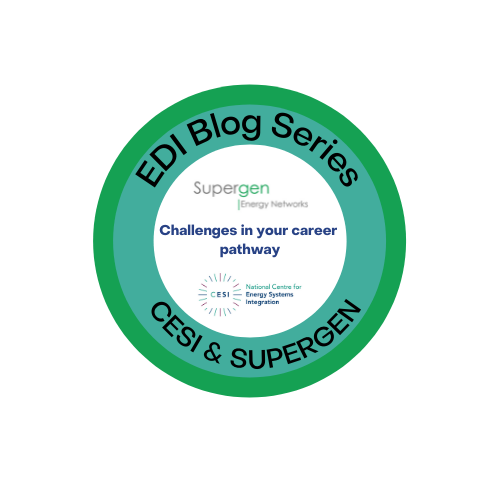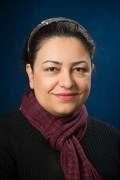About the Author:


Dr Mansoureh Zangiabadi is a Research Associate at Newcastle University, working within the Electrical Power Research Group.
Her main research topics interest:
- Smarter solutions of future power systems (Electrical Battery Storage, Demand Response, Renewable Energy Resources, Micro Grids)
- Whole energy network roadmap of future (energy hub management)
- Electrification of Transport, Electrical Vehicles and Electrical Railway
My life in Iran
I grew up in family a of two siblings in Iran; my two brothers are both engineers, so it was no doubt that I was interested in engineering subjects from a young age. Since school and college, maths and physics have been my two favourite subjects. I dreamt about being an astronomer and understanding physics behind.
I received my B.SC in Electrical Engineering from University of Kerman/ Iran. I remember, I aspired to work in the places that repair electric equipment such as TVs, Vacuum cleaners and so on. However, at that time, culturally it was not possible for girls to work in these very male dominated environments. It is worth mentioning that schools in Iran were and are still single sex from primary school to secondary schools and high schools (there are boys schools and girls school separately) even many colleges are single sex too. Universities are mixed sex but there are still some subjects that only men are allowed to study in universities in Iran.
My parents were always very supportive and encouraging in all decisions that I made in my life. Following up with understanding electrical equipment through repairing them, when I was 17 years old, I remember my dad and I tried to repair our vacuumed cleaner together, but we forgot to note how it was assembled in the first place and it never worked again!
Despite the gender imbalance, I pursued my studies in electrical engineering and I received my M.SC in Electrical Power Engineering from Isfahan University of Technology and my PhD from University of Tehran/Iran. Teaching has been always a passion in my life; from time to time, I was teaching maths and physics at high schools and then moving to teaching electrical engineering modules in colleges and Universities. I then began working as a Lecturer in Azad University Kerman for four years teaching several modules in electrical engineering as Electrical Circuit Theory, Power System Transmission and Cables modelling, Electrical System Analysis and Operation and Electrical Machines. I also had a very good collaboration with Utilities and Distribution System Operator (DSO) companies in Iran.
Exploring the World
I always loved to explore the world, my income was never enough but it did not stop me, and I worked very hard and saved my money for my dream. It was the first time during my PhD, that I had the opportunity to present my paper in CIRED conference in Spain and which is an experience that I will never forget. I presented the paper in front of my dad (my accompany in Conference) and I was so proud that my hard work paid off. I was even able to pay for my dad’s trip expenses which is something I was very proud of.
After that conference, I visited France during my PhD as exchange student in INP Grenoble / France for 9 months. I married my husband while he was studying his PhD in Norway, it was the reason that I visited and lived for some years in Norway. I also worked in Norway for few years but mainly I was always traveling Iran to finish my PhD which was not easy as I had my first daughter born in Norway at that time. Norway is built on equal opportunities values for all and very much supporting women in achieving their goals. We moved to UK in 2013 and settled in Newcastle. Newcastle university and northeast people; their friendly culture was the most welcoming received in UK. I love Newcastle more as it is the birthplace of my second daughter.
Facing challenges in the workplace as a woman
I have always been an advocate voice for STEM and women in engineering community and participated in such activities. My educational journey in Iran was tough, as at that time there were little opportunities for girls to pursue their studies in higher education, due to conflict war between Iran/Iraq. Recent statistics show that 50% of higher education entries in Iran are girls and engineering is a popular subject to pursued. The job market has not been prepared for this move and it is not easy for women to work in tough environments, for example steel factories and so on.
Despite gender limitations in Iran, Iranian women have been very successful in STEM and engineering subjects. However, a cultural move is required to support girls and women in Iran. In Norway, France and UK, the places that I lived and worked, the gender imbalance in STEM and engineering subjects is apparent and even the same in all over the world. I believe men support is needed to help reduce the imbalance through proactively encouraging women to join STEM subjects.
My challenge in the workplace was the unconscious bias of my male colleagues which have been always doubting women capability and underestimation of women competence. I have seen that my male colleagues are given more opportunities in different ways. For an example, my male colleges have the advantage of friendly citing their male colleagues’ papers and increasing their H index collectively. As there are only few females in academia for now in power engineering subjects, so it is not easy to achieve the same trend for me and my female colleagues in academia. It means criteria needs to be changed in a way to give opportunities to women to get experience in teaching, in research and in securing funds in academia. There are many other challenges for women working in high male dominated environments in all over the world, nevertheless men are learning to be more supportive and are more proactive in presenting opportunities for women.
Hope for the future!
The future is bright; men and women are collectively recognising their strengths and weaknesses and are supporting each other to flourish. Our human brains have an extraordinary ability to coordinate with each other and to share values, and I believe together we will help to reduced inequalities.